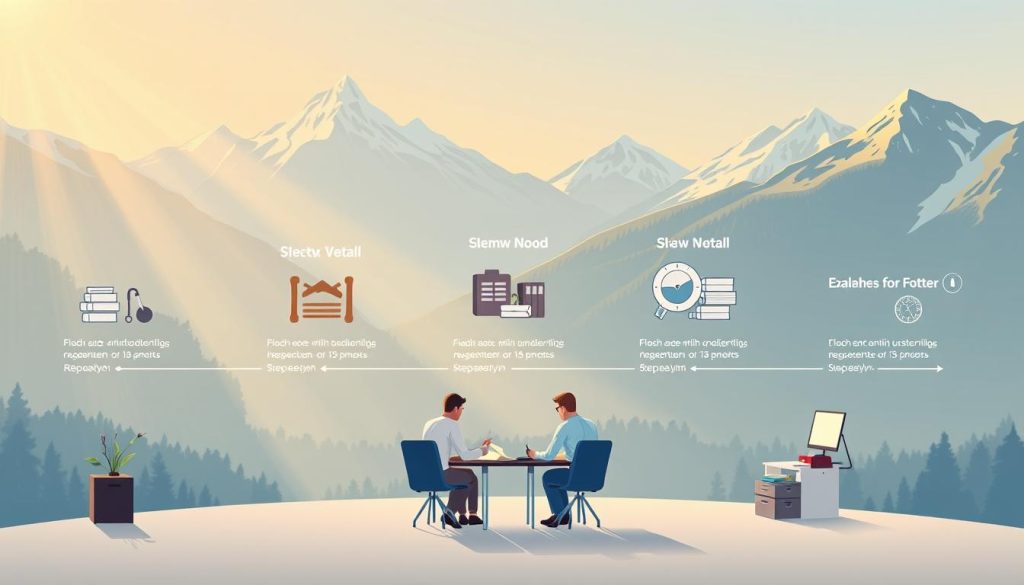In recent years, starting a non-profit in Austria has become key for those wanting to make a difference. It’s not just about the legal steps; it’s about tackling big social issues and supporting good causes. Knowing Austria’s rules and how things are run is key to making a real difference.
Understanding Non-Profit Organisations in Austria
In Austria, knowing about non-profit organisations is key for those wanting to help without making money. We look into what non-profits are, the laws in Austria for them, and their benefits. These can greatly help us make a positive change.
Definition and Purpose
A non-profit organisation focuses on helping others, not making a profit. They aim to improve society by providing services for social, cultural, and environmental needs.
Legal Framework
Austria has strong laws for non-profit groups. These laws help keep things clear, fair, and in line with Austrian law. This ensures they work well and for the right reasons.
Benefits of Non-Profit Status
Being a non-profit has many good points. Some of the main ones are:
- They can get tax breaks, which helps with money issues.
- They are seen as more trustworthy, which brings more support.
- They can get more money from grants and donations.
Steps to Establish a Non-Profit Organisation
Setting up a non-profit organisation is a big task. It involves several key steps to get your mission off the ground. We’ll guide you through these steps, from picking the right name to registering your organisation. Each step is important for following local laws and running your organisation well.
Choosing the Right Name
The first step is to choose a great name for your non-profit. The name should show what your organisation stands for and meet legal standards. Make sure the name you pick is unique and reflects your mission.
Drafting the Statutes
After picking a name, we need to write the statutes. These documents explain how your organisation will work, who makes decisions, and what it aims to achieve. It’s important to be clear and detailed here. Good statutes help avoid confusion and make governance easier.
Registering the Organisation
The last step is to register your non-profit with Austrian authorities. This step makes your organisation official and opens up funding and visibility opportunities. You’ll need to gather all the right documents to show you meet legal requirements. For help and more information, contact us.

Legal Requirements for Non-Profit Registration
Starting a non-profit in Austria means following certain legal steps. It’s important to know about notary services, the documents needed, and how long it takes. This knowledge is key to a successful start.
Notary Public Services
A notary public in Austria is essential for registering a non-profit. They make sure our documents are right and follow the law. We’ll need to show them our statutes and other important papers for legal approval.
Required Documentation
To register a non-profit, we need some key documents. These include:
- Proof of our purpose and activities
- Statutes that explain how we’re run and what we do
- Details about who started the organisation
- Proof that our documents were checked by a notary
Having these documents ready helps us avoid delays and meet legal requirements.
Timeline for Registration
The time it takes to register a non-profit varies. It depends on how complex our documents are and how fast the authorities work. Usually, it takes four to eight weeks if everything is in order. Knowing this helps us plan better.
Roles and Responsibilities in Non-Profits
It’s key to know the roles and duties in non-profit groups for good governance. The setup depends on the help of board members and the difference between volunteers and staff. Also, following laws and rules keeps the group honest and going strong.
Board Members and Governance
Board members are vital in leading a non-profit. They do more than just plan; they make sure the group follows laws and ethics. Their main tasks include:
- Making smart choices for the group.
- Checking the finances and following rules.
- Guiding the team and giving direction.
Volunteers vs Employees
It’s important to tell volunteers and staff apart in non-profits. Volunteers give their time and skills for free, while staff get paid. This affects things like:
- Legal and tax matters.
- What’s expected of them.
- Following work laws and rules.
Compliance Obligations
Keeping up with rules is vital for trust from donors and others. Non-profits must follow many rules, like financial reports and being open. By doing this, they protect themselves legally and encourage honesty among everyone involved.

Funding Options for Non-Profit Organisations
Getting funding is key for non-profits to keep going and reach our goals. In Austria, we have many ways to get more money. This includes grants, sponsorships, and fundraising events. These can really help our organisation grow.
Grants and Donations
Grants are a big help for non-profits in Austria. They come from the government and private groups. Grants in Austria have rules, so we must match our projects to theirs. Donations from people and companies also help, making our community feel involved.
Sponsorships and Partnerships
Sponsorships let us work together with businesses. This way, we share resources and knowledge. It’s good for both sides, boosting our image and getting more support.
Fundraising Events
Hosting fundraising events is a smart move. They can be big or small, reaching out to many people. Good strategies help us not just make money but also build stronger community bonds.
Tax Benefits for Non-Profits in Austria
It’s key to know the tax perks non-profits get in Austria. They can get tax-free status, which means more money for their causes. But, they must follow certain rules to keep this status.
Eligibility for Tax Exemption
To get tax-free status in Austria, non-profits must meet some rules. These include:
- Having a clear non-profit goal
- Working for the public good without making a profit
- Following tax authority rules
Reporting Requirements
To keep tax-free status, non-profits must report regularly. They need to share financial details that show how they spend money. This helps prove they’re doing their job right.
Tax Regulations
Taxes for non-profits in Austria can be tricky. There are rules for income tax, value-added tax, and more. Knowing these rules helps non-profits stay on track and use tax breaks wisely.

Importance of Strategic Planning
In the world of non-profit organisations, strategic planning is key to long-term success. It helps us set clear goals and make decisions. This way, we can meet community needs and connect with our audience well.
Setting Objectives and Goals
Having clear, measurable goals helps us understand our mission better. Our goals should be specific, achievable, relevant, and have a deadline. This ensures our efforts align with our mission and help the community.
Identifying Target Audience
Knowing our audience well lets us tailor our work better. We use data and surveys to understand community needs. This focus helps us engage more and make a bigger difference.
Assessing Community Needs
Understanding community needs is vital. We do this through talks, focus groups, and data. This helps us improve our plans and make sure our help is effective.
Building a Strong Online Presence
In today’s digital world, having a strong online presence is key for non-profit groups. Our website is often the first thing people see. It’s important to make it welcoming and full of useful information.
Good web design makes our site easy to use and looks great. It should clearly show what we’re about. This helps us connect with more people.
Importance of Web Design
Good web design makes it easy for visitors to find what they need. It shows who we are and makes people trust us. Key parts of good design include:
- Clear and simple navigation
- Mobile responsiveness
- Accessible content for all users
SEO for Non-Profit Websites
SEO is vital for getting more people to see our site. It helps us reach those looking for our mission. Key SEO tips for non-profits include:
- Using the right keywords
- Optimising meta tags and descriptions
- Creating content that meets community needs
Social Media Strategies
Social media is key for connecting with our community. Sites like Facebook, Twitter, and Instagram help us share our story. Good strategies include:
- Posting updates and success stories often
- Using pictures to grab attention
- Getting people involved with polls and questions

Collaborating with Other Organisations
Working together with other groups is key to making our non-profit work better. By teaming up, we can share resources and knowledge. This helps us make a bigger difference in the community.
Joining forces with similar groups opens up new chances for growth. It’s hard to achieve alone.
Building Partnerships
Creating partnerships with other non-profits boosts our efforts. These partnerships help us:
- Share resources, like money and skills.
- Start joint projects that use each group’s strengths.
- Reach more people and grow our audience.
Community Engagement
It’s important to listen to the community we serve. Working with other groups helps us:
- Spread the word about what we do.
- Give volunteers chances to make a real difference.
- Get feedback that shapes our work.
Networking Opportunities
Being part of networks brings new ideas and chances to work together. At community events and forums, we:
- Learn from others in different fields.
- Find funding through shared contacts.
- Get seen and respected by the community.
If you want to improve your non-profit’s partnerships, we’re here to help. Building strong connections helps everyone. You can start by reaching out to relevant groups in your area.
Financial Management for Non-Profits
Good financial management is key for non-profits to grow and stay strong. We need to focus on budgeting, reporting, and how we use our funds. This way, we make sure our money helps us achieve our goals.
Developing a Budget
A budget is the heart of our financial plan. It helps us predict our income and expenses and stay true to our mission. Here’s what to keep in mind when making a budget:
- Look at past money data to spot patterns.
- Talk to people who support us to understand what we need.
- Include both fixed and changing costs in the budget.
Financial Reporting
Being open with our money builds trust with our supporters. Regular reports show how we’re doing financially and how we’re spending our money. Important parts of these reports are:
- Monthly statements to check our income and spending.
- Quarterly balance sheets to see our assets and debts.
- Annual reports to sum up our financial year for everyone.
Fund Allocation
How we use our funds is critical to our success. By focusing on what works best and our goals, we make sure our money goes where it’s most needed. Key points for using funds wisely are:
- Check how well our programmes are doing to decide where to put money.
- Use money based on what the community needs.
- Plan for unexpected costs.
Leveraging Technology for Efficiency
In today’s digital world, technology non-profits need to use new solutions to work better and achieve their goals. By choosing the right tools, we can make payment processing easier, boost online fundraising, and manage data better. These steps not only make our work smoother but also help us connect with our supporters more strongly.
Payment Processing Solutions
Using modern payment solutions lets us take donations easily and safely. When picking these platforms, look for:
- User-friendly interfaces for both donors and administrators
- Integration with our websites and fundraising tools
- Strong security to keep information safe
- Options for one-time and ongoing donations
Online Fundraising Tools
Online fundraising tools are key to reaching more people and getting more donations. With these tools, we can:
- Make engaging fundraising campaigns
- Use social sharing to spread the word
- Track how our campaigns are doing in real-time
- Send personal messages to our donors
Data Management Systems
Good data management systems help us see our impact and make better plans. The main benefits are:
- One place for all donor info and activity
- Tools to understand our fundraising and donor trends
- Automated reports for easier compliance and openness
Creating Effective Marketing Strategies
For non-profit organisations, making effective marketing strategies is key. It helps us get noticed and gain support. A clear brand identity shows who we are and connects with people.
Through smart marketing, we share our goals and reach out to supporters better.
Branding and Identity
Branding is more than just a logo or colours. It’s about our mission and values. A strong brand identity makes our values clear to the community.
This encourages them to support us. A good brand builds trust, boosts donations, and grows our reach.
Establishing a Communication Plan
A solid communication plan is essential for sharing our message. It covers both online and offline methods. This way, we reach supporters through different channels.
Social media, newsletters, and local events help spread our message. They also involve the community in our work. By using smart marketing, we improve our outreach and community ties.
Online and Offline Marketing
Combining online and offline marketing boosts our reach. Online, we use social media, blogs, and our website. These platforms help us target our message effectively.
Offline, events and partnerships build personal connections. They help us form stronger bonds. For more marketing ideas, check out this link.

The Role of Volunteers in Non-Profits
Volunteers are the heart of many non-profit groups, pushing their missions forward with their hard work and enthusiasm. It’s key to manage volunteers well to make the most of their skills. We focus on finding people who share our goals and values.
Recruitment Strategies
To build a strong team of volunteers, we use different ways to attract them. Here are some methods we find effective:
- Using social media to share our mission and volunteer spots.
- Working with local community centres and universities to find eager helpers.
- Organising events where people can meet our team and learn about our work.
Training and Development
After volunteers join us, we offer them training to make them feel ready and confident. We run workshops and refresher courses to improve their skills. This not only makes them happier but also helps us achieve our goals better.
Recognition and Retention
It’s important to thank our volunteers to keep them with us. We celebrate their contributions with awards, certificates, and special events. This makes them feel valued and part of the team. We also keep in touch and support them to keep them involved and committed.
Regulatory Compliance and Reporting
For non-profits in Austria, following the rules is key. We have to keep track of our work and report it. This helps us follow the law and stay true to our values.
Monitoring Activities
We need to watch our activities closely. Keeping good records helps us meet the changing rules. This includes our money, what we achieve, and how we interact with others.
By watching our activities, we can spot problems early. This helps us stay on the right path.
Annual Reporting Obligations
Every year, we must send in detailed reports. These reports show what we’ve done and how we’ve spent our money. They prove we’re doing well and help us stay trusted by the community.
Being on time and accurate with our reports is important. It shows we’re reliable. You can learn more about what we need to do in the terms provided by Business Austria.
Auditing Processes
We regularly check our finances through audits. This makes our work open and gives our supporters confidence. Audits are a big part of keeping us in line with the rules.
Having auditors keeps us honest. It makes sure we follow the rules for non-profits.
The Impact of Non-Profit Organisations
Non-profit organisations do more than just give to charity. They play a big role in society and make community life better. By understanding their impact, we see how they can change lives and improve our community.
Measuring Success
It’s important to know if a non-profit is doing well. We can check by:
- Tracking how many people join their programmes
- Seeing how happy people are through surveys
- Looking at how much good they do in the community
These steps help us see how we’re doing and make things better. By measuring success, we can make our work more effective for our community.
Community Benefits
Non-profits bring many benefits to the community. They help people come together, offer important services, and teach and help others. By tackling local problems, they make our community a better place. Investing in our community pays off for everyone in the long run.
Long-Term Goals
Setting long-term goals is key to keeping a non-profit successful. We need to keep our mission in line with the community’s changing needs. This can be done by:
- Checking regularly what the community needs
- Working with other local groups
- Being open and accountable
This way, we stay strong and build trust and teamwork in the community. For more on how to improve, see our privacy policy.
Getting Professional Assistance with LerriHost
Starting a non-profit organisation is filled with legal and administrative tasks. At LerriHost, we offer the help non-profits need to run smoothly. Our team makes setting up your organisation easy, so you can focus on your mission.
Company Formation Services
Building a strong base is key for any non-profit. Our services cover everything needed to get your organisation off the ground. We take care of the details, like drafting articles and filing documents, so you can focus on your mission.
Nominee Services
We also offer nominee services to help non-profits. This service gives you privacy and ensures legal compliance. Our team supports you, letting you focus on helping your community.
Ongoing Support and Maintenance
Our support doesn’t stop after setting up your non-profit. We offer ongoing help to keep things running smoothly. Whether it’s compliance checks, admin tasks, or advice, LerriHost is here to help. For more information, visit this page.
Contacting Us for More Information
If you want to start a non-profit in Austria, LerriHost is here to help. We offer detailed support for every step, from planning to registration. Our team will guide you through legal and operational tasks, making your non-profit successful.
Our Services Overview
We have a range of services for non-profits. Our team helps with setting up your company, paperwork, and keeping up with rules. At LerriHost, we know the non-profit world well and are ready to help you.
How to Reach Us
Get in touch by calling 07538341308 or using our online form. We’re ready to give you information and answer your questions about our services. We’re excited to help you start your non-profit in Austria.
Consultation Options
We offer flexible consultations to meet your needs. You can choose a one-on-one session or a group workshop. We’ll work together to make sure your non-profit is a success from the start.







